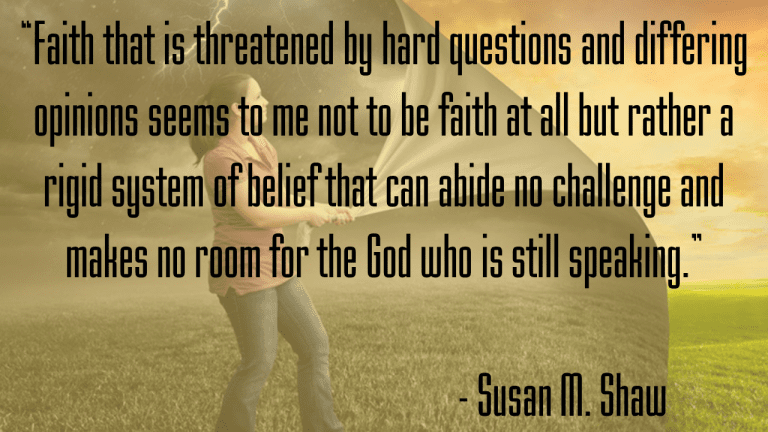I want to share some thoughts inspired by a recent Sunday school class of mine in which the beloved conservative question came up again: “But what if you’re wrong?” We had reached 1 John 2:2 some weeks earlier, and the reference to Jesus being an atoning sacrifice not only for our sins, but those of the entire world, led a retired minister to bring up the topic of universalism. I was quick to emphasize that there is such a thing as Christian universalism – not the vague notion that everything will work out okay in the end, but the view that the God of Jesus will ultimately reconcile all things to God as well as to one another.
Anyway, today we started exploring this possibility, discussing texts that seem relevant, and as it became clear that I was sympathetic to the possibility, a number of challenges were forthcoming from someone in the class who is significantly more conservative than I am. As I responded to the points made, eventually the question was posed that many conservatives assume is the decisive moment in their victory against the forces of liberalism.
I was asked, “But what if you’re wrong?”
Because this was not at all the first time I had thought about these issues, or been confronted with that question, I eagerly dove into asking why the possibility of my being wrong should be a problem for this stance but not for that which my interlocutor holds. If I’m wrong, I’ve explored a possibility and held out a hope that was incorrect. Ironically, according to the theology of many conservative Christians, as long as I made a true confession of faith at some point, my wrongness would not condemn me to eternal punishment. And yet in practice, getting doctrine wrong is often treated as though it were the unforgivable sin.
If conservatives are wrong, they may have driven countless people away from God through their depiction of God as neither merciful nor just (even though they claim God is both, albeit with justice trumping mercy in the end, in keeping with their theological conviction that rightness matters more than kindness when push comes to shove.)
Does that matter? Yes, it matters in the same way that the good news matters to me even if I hold out hope that all things and all people might ultimately be reconciled to God. If one’s child is bound to cope with life and be OK in the end, do we not as parents nonetheless feel a desire to help them avoid unnecessary pitfalls, to say nothing of self-destructive paths involving crime or the like? Is the only reason to care the question of eternal destiny? If conservative Christians think that, it says something about them. But it doesn’t necessarily say the same thing about God, however much it explains why their concept of God is what it is.
Appropriately, it is the failure to envisage God as merciful and compassionate in precisely the ways that good human parents are that shows up the issues with conservative theologies of eternal punishment most starkly. No parent would want to subject their child to purely punitive torments that were endless for any non-eternal wrongs they might have done to us or to others.
The fact that many conservative Christians also affirm eternal security – summed up in the popular phrase “once saved always saved” – also creates an ironic state of affairs. For the “what if you’re wrong?” question is really just a form of Pascal’s Wager, which fails because it bumps up against the fact that there are countless ways of being wrong that might perhaps matter. If a conservative Christian is wrong that salvation is by grace alone through faith obtained (I’m tempted to say “earned”) by believing in the atoning sacrifice of Jesus, and that once one believes one will be saved no matter what else they might do, then for many their lifestyle and attitude is perilous.
I think the appropriate thing to say to conservatives who ask “but what if you’re wrong?” is to offer a positive (ideally, a biblical) explanation for why we hold the stances or entertain the possibilities we do. And then to ask, “but what if you’re wrong?” not only about the specific doctrine under discussion, but also others. Hopefully it might help them to realize that their own theological tenets are not simply a given but a choice or a set of assumptions on their part, which deserve to be thoughtfully considered and reconsidered rather than merely taken for granted.
That, when it comes down to it, is what we try to do in my Sunday school class at Crooked Creek Baptist Church, and I’m so delighted to have the privilege to explore these things with such a great, supportive, yet also challenging and critical community in this way.
For previous blogging about this topic and other posts related to it see:
And also:














